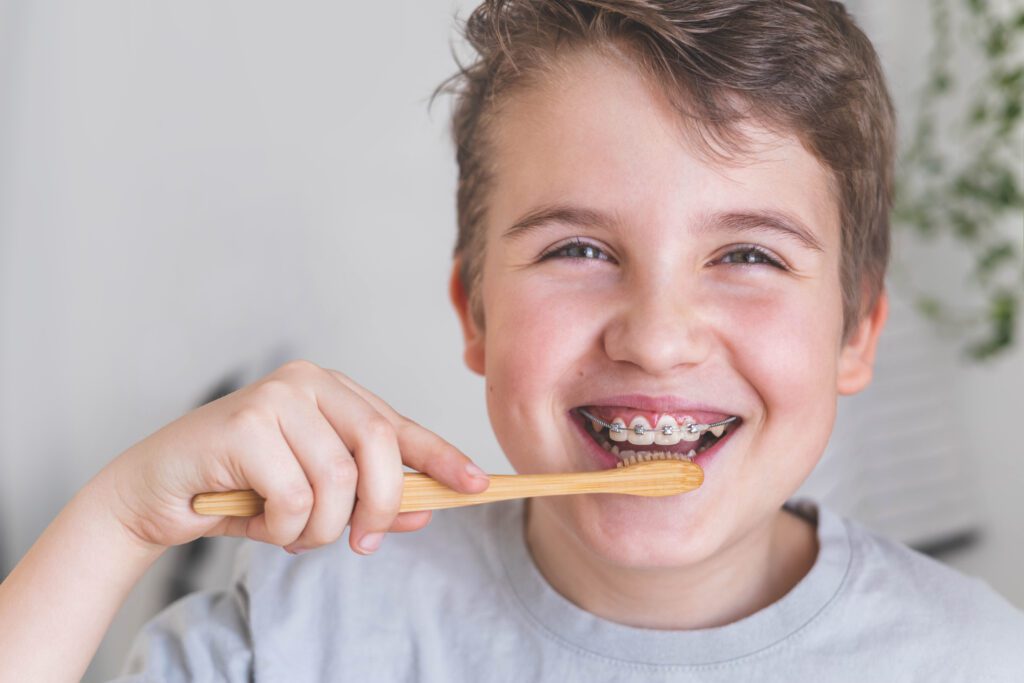Maintaining oral hygiene with braces is crucial for several reasons. Braces create extra spaces where food particles can easily get trapped. These particles can lead to plaque buildup and cavities if not properly removed. Proper oral hygiene prevents these issues and ensures your orthodontic treatment progresses smoothly. Neglecting oral hygiene can cause gum disease, which can delay your orthodontic treatment and lead to more severe dental issues. Moreover, maintaining good oral hygiene with braces helps in achieving the best possible outcome for your treatment.

Brushing Techniques for Braces
Brushing with braces requires special techniques to ensure all areas are cleaned effectively. Use a soft-bristled toothbrush to avoid damaging the braces. Angle the brush at 45 degrees to your gums and brush the top and bottom of each bracket. This helps remove food particles and plaque from hard-to-reach areas. Brush gently to avoid damaging the braces and wires. Brush for at least two minutes, making sure to cover all surfaces, including the front, back, and chewing surfaces of your teeth. Electric toothbrushes can be very effective as they often remove plaque more efficiently. Consider using a toothbrush with a small head, which can better navigate around the brackets and wires.
Choosing the Right Toothpaste and Mouthwash
Selecting the right toothpaste is essential for maintaining oral hygiene with braces. Use fluoride toothpaste to strengthen your enamel, as fluoride helps prevent cavities. Mouthwash can also be beneficial in maintaining oral hygiene. Choose an antibacterial mouthwash to help reduce plaque and gingivitis. Avoid mouthwashes with alcohol, as alcohol can irritate your gums and cause dryness. Using a fluoride mouthwash can provide additional protection against cavities and help keep your breath fresh. Rinse your mouth with mouthwash after brushing and flossing to ensure all areas are clean.
Flossing with Braces
Flossing with braces can be more challenging, but it remains essential for maintaining oral hygiene. Use a floss threader to guide the floss under the wires and gently floss between each tooth. This helps remove food particles and plaque that brushing alone cannot reach. Consider using interdental brushes, which can clean between brackets and under wires more effectively. Water flossers can also be effective, as they use a stream of water to remove food particles and plaque. Make flossing a daily habit to ensure your teeth and gums remain healthy throughout your orthodontic treatment.
Regular Dental Check-Ups
Regular dental check-ups are vital for maintaining oral hygiene with braces. Visit your dentist every six months for professional cleanings and check-ups. These visits allow your dentist to remove any plaque or tartar buildup that you may have missed during your daily oral hygiene routine. Your dentist can also check for any issues, such as cavities or gum disease, and provide early intervention to prevent more severe problems. Your orthodontist will also monitor your braces and make any necessary adjustments to ensure your treatment progresses as planned. Regular check-ups are essential for achieving the best possible outcome for your orthodontic treatment.
Dietary Considerations
Your diet plays a significant role in maintaining oral hygiene. Avoid sticky and hard foods, as these can damage your braces and make cleaning more difficult. Sticky foods can get stuck in your braces, leading to plaque buildup and cavities. Cut hard foods into smaller pieces to reduce the risk of damaging your braces. Drink plenty of water throughout the day, as water helps wash away food particles and bacteria. Avoid sugary and acidic foods and drinks, as these can contribute to tooth decay and weaken your enamel. A healthy diet supports your oral hygiene efforts and ensures your braces remain in good condition.
Using Orthodontic Tools
Several tools can aid in maintaining oral hygiene with braces. Orthodontic toothbrushes have special bristle patterns that help clean around brackets and wires more effectively. Interdental brushes can reach areas a regular brush cannot, making them useful for cleaning between brackets and under wires. Water flossers are also useful, as they can clean around braces more effectively than traditional flossing. Consider using a proxabrush, which is designed to clean around orthodontic appliances. These tools can make your oral hygiene routine more effective and ensure your teeth and gums remain healthy throughout your treatment.
Maintaining oral hygiene with braces requires effort and dedication, but it is essential for your dental health and the success of your orthodontic treatment. Follow these tips to keep your mouth healthy and ensure your treatment progresses smoothly. For all your orthodontic needs, visit Flower Mound Orthodontics. Dr. Wayne Sankey and his team are here to help you achieve a beautiful, healthy smile.

